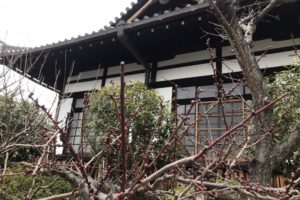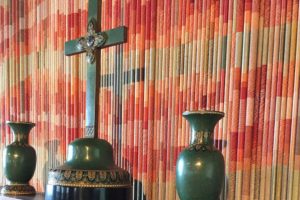Proper 16, August 21, 2022
Isaiah 58: 9-14, Hebrews 12:18-29, Luke 13:10-17
Jeffrey Bowyer
The sermon today is about three stories on the three mountains. The three mountains that were within our scripture readings were Sinai, Zion, and Calvary. On these mountains, we learn how we can find healing and wholeness. Although only Zion is named in the readings, it is understood all three of these mountains overshadow the words in Hebrews. Each mountain presents a fuller picture of God without superseding the image that came before it.
The first mountain is Sinai. Sinai was in the wild, untamed expanse of wilderness the Hebrews crossed as they left Egypt. This is the place our reading from Hebrews describes, saying, “You have not come to something that can be touched, a blazing fire, and darkness, and gloom, and a tempest, and the sound of a trumpet, and a voice whose words made the hearers beg that not another word be spoken them.”
The encounter with God on Mount Sinai is an encounter with a mighty and dreadful presence, the unseen deity atop a mountain. The people do not approach God themselves, but through Isaiah or in the other reading of Jeremiah. They are prophets and serve as a mediators.
The second mountain in the reading yesterday was Zion. This mountain inside the city of Jerusalem has long been associated with the Temple Mount. At the Temple on Mount Zion, the priests served as mediators between God and the people in their role of offering sacrifices to God.
The author of Hebrews calls Zion the city of the living God, the heavenly Jerusalem. Unlike Sinai in the wilderness, Zion was a known hill within the walled city. God’s presence had moved from the unknown to the familiar. The knowledge that God’s presence was felt in the Temple in a powerful way. In the same way, we can feel God’s presence in a particular way in church. So the priests are serving as the mediators for us.
The third mountain is Calvary. The author of Hebrews refers to Jesus as the mediator of the new covenant, which brings us to the mountain where Jesus was crucified. Jesus sealed the new covenant with his blood shed on Calvary. No longer do we approach God through Moses or the priests. Jesus is our mediator and advocate and the holy spirit is within us.
Our reading from Hebrews says that we have come, “to the sprinkled blood that speaks a better word than the blood of Abel.” Genesis tells the story of Cain killing his brother Abel. Abel’s blood cried out for revenge. But the blood of Jesus was a much more worthy offer. Jesus was God in human flesh and as a human was, like Abel, killed unjustly. And yet, Jesus’ blood shed on Calvary cried out not for vengeance, but for love and redemption.
We see this goodness in the Gospel reading of Luke, where Jesus finds the woman who is bent over and suffering. Healing her is more important than the Sabbath rules which would have her continue in pain. We know that some will stand up for rigidly following rules and but that Jesus will act on grace and mercy. We are not surprised when Jesus sees her, knows her pain, and sets her free. Jesus moves beyond the rules that bind to healing and wholeness that liberate. This is the Holy One who was present on Sinai, Zion, and Calvary, who is with us now. This is the Lord God who chose not to merely stand back as a righteous judge.













